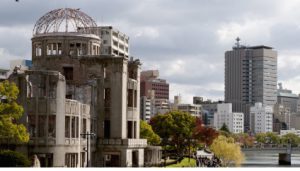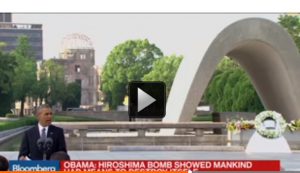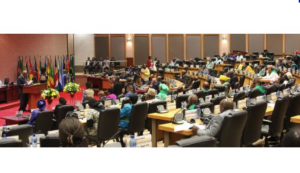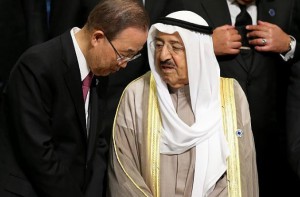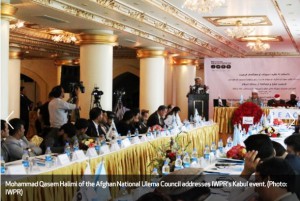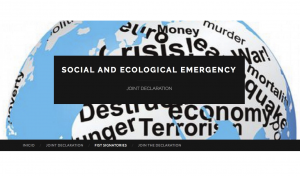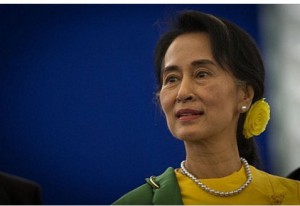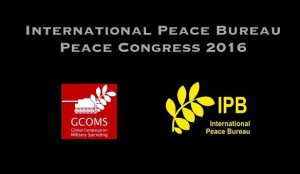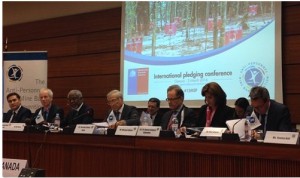DISARMAMENT & SECURITY .
An article byJavier Gárate, Waging Nonviolence (abbreviated)
After a week-long trial that ended on April 15, a judge from the Stratford Magistrate Court in London found me and seven co-defendants not guilty for our actions last September to shut down the Defence Security and Equipment International arms fair, or DSEI, on the basis that we were preventing a greater crime. This is a huge victory in the long struggle to shut down one of the largest arms fairs in the world, which takes place in east London every other year.
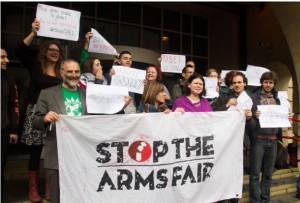
The activists celebrated when their not guilty verdict was announced outside the court on April 15. (WNV/Andrew Dey)
Click on the photo to enlarge
The last fair was in September 2015, and it saw more than 1,500 exhibitors from around the world displaying the latest technology of the war industry. DSEI is an invitation-only event, where invites go to governments, industry representatives and specialized press. Delegations from repressive regimes and countries violating human rights — such as Saudi Arabia, Turkey and Israel — walk through its corridors every other year browsing the latest weaponry. This huge event is not just to showcase the latest technology, but also to facilitate new sales. . .
It all started on September 7 with a day of action to stop arming Israel. The first action was a blockade — for hours — of an armored vehicle that was heading to the Excel Centre. On the days that followed there were actions focused on faith groups against war profiteering, the arms trade and climate change, academics against the arms trade, and freedom of movement, not of weapons. The week concluded with a “Big Day of Action.” The Stop the Arms Fair coalition and Campaign Against Arms Trade, or CAAT, provided the general frame for the different focuses each day and supported groups taking actions, but each group doing an action was self-organized.
By connecting the issue of the arms trade to other struggles — such as Palestinian solidarity, climate change and refugees — it meant that a diversity of groups got involved during the week. Important bridges were built between movements, and the arms trade was seen not as an isolated problem but rather as part of the wider struggle for social justice. . . .
We decided to do our action on the Big Day of Action called for on September 12, which had the aim of gathering as many people as possible to continue to disrupt preparations for the arms fair. During the morning of the action there were speeches from a wide range of groups and organizations. As the day progressed, we took the streets and the police began to remove us to let the traffic pass. At one point, the police were taking longer to act, and the three of us took our gear, ran to the road and got on the ground, locking ourselves together using the arm tubes.
This meant we had secured the blockade for some time, as the police in the United Kingdom — in most cases — will not just move you if you are locking on. The blockade provided a perfect place for people to gather, and a loudspeaker was used to continue with presentations. During the hours that we were on the blockade we heard from Isa Alaali, a Bahraini citizen, about the torture he experienced, as well as the U.K. military’s support of the Bahraini regime. We also heard from Mexican activists about the Ayotzinapa struggle for justice and the militarization of Mexican society.
From the beginning, the police came to tell us that if we didn’t unlock ourselves they would arrest us. But they didn’t seem to be in much of a hurry. Hours passed and there was no sign that they were going to cut our tubes and arrest us. After several hours the police finally made their move, clearing the road of all the other protesters. In the end, they arrested the three of us on charges of willful obstruction of the highway.
Even though at any moment we could have released ourselves and avoided arrest, we wanted to maintain the blockade to disrupt the preparations of the arms fair for as long as possible. We were also aware that arrest could mean being charged and put on trial, but we didn’t really think much about it at the time. Our focus was on the action itself. After the arrest we were in custody for only a few hours before being given an order to come back to court a month later.
Putting the arms trade on trial
That court appearance was crucial. We could either plead guilty and pay a fine or plead not guilty and face a trial. It was not just the three of us in court, but everyone who had been arrested during the week of action against DSEI. For some time I was unsure what to plea. I wasn’t really in the position to face a long trial, and it seemed that the chances of winning in court were small. But at the same time I saw it as an opportunity to learn how to use the court in campaigning, as I had been arrested in the past but never gone to court. The fact that all the other arrestees were clear on pleading not guilty helped me make the decision. This was a collective action and we would treat the trial collectively as well. The goal was to put the arms trade on trial by facing trial ourselves. . . .
During the trial, which was scheduled to last five days, we heard evidence from all eight co-defendants. Among them was Alaali, who was forced to flee Bahrain after being imprisoned and tortured for his participation in the 2011 protests. During the uprising, thousands of Bahrainis protested and were crushed by force with a violent intervention from Saudi Arabia. Thousands were arrested and hundreds killed. Isa told the court that he was arrested three times in 2013, and that police held a gun to his head. He was taken to the police station and stripped and beaten until he became unconscious. The police tied his hands behind his back, beat him and threatened to cut off his penis in an effort to force him to give false confessions. Bahrain has purchased nearly $65 million of weapons from the United Kingdom since the 2011 uprising. Needless to say, Isa felt compelled to protest at DSEI.
(continued in right column)
Question for this article:
How can the peace movement become stronger and more effective?
(continued from left column)
Lisa Butler, another co-defendant, highlighted the ongoing mass killings of the Kurdish people by Turkey. Having visited Kurdistan recently, she explained to the judge about the violent curfews that have been imposed on Kurdish cities. Tanks and rockets have been firing shells and mortars into the cities and snipers have been gunning people down on the street, including children. Instead of banning Turkey from DSEI, the British government welcomed these war criminals with open arms.
Other defendants stated that they were particularly concerned with the sales of arms to countries such as Saudi Arabia, Pakistan and Israel. As such, they were compelled to act because illegal weapons, such as torture equipment, have been found at previous DSEI events.
“In every single previous arms fair, at least since 2005, illegal activity has been found to be happening,” co-defendant Tom Franklin told the court. “We have evidence of that. We have parliamentary reports. We have reports from Amnesty International. We have reports from Caroline Lucas, the Green MP, listing illegal weapons being sold.”
When my turn came to give evidence I was quite nervous. The entire time that I was being cross-examined by the prosecution I felt like I was giving the wrong answers, undermining my case. But at the same time, I knew that it was the right thing to do — to stand there and denounce the crimes happening at DSEI. My statement also focused on growing up in Chile under the military dictatorship of Augusto Pinochet and the impact this had on me as a kid.
“I lived under a dictatorship for nearly 10 years. I remember curfews and a general sense of fear of the police and the military due to the horrible regime’s repression,” I testified. “The father of my school classmate was murdered by the secret police when I was six years old.” I also mentioned in court that for many years I had been protesting in different ways against DSEI and that for me the action was not just about ending the sale of illegal weapons, but to shut down the fair as a step toward stopping the war machine. After giving evidence, there was a huge weight taken off me.
We were joined in court by expert witnesses. Among them was Oliver Sprague from Amnesty International, who talked about the illegal weapons that have been sold at every DSEI arms fair. He also highlighted the “legal” weapons that are used illegally. In his report, Sprague gave evidence of arms being used in the Yemen war. “[The Yemen] conflict has cost at least 3,000 civilian lives, 2.5 million people [have been] displaced and 82 percent of the population — some 21.2 million people — currently require some form of humanitarian assistance,” he testified. “Importantly, official delegations from countries directly involved in military action in Yemen were in receipt of official U.K. government invitations to the event, including Saudi Arabia, the United Arab Emirates, Egypt, Kuwait, Bahrain, Morocco and Jordan.”
Sprague told the court that Saudi Arabia is the largest recipient of U.K. arms. Indeed, from July to September 2015, the British government granted export licenses for bombs — of the type being used in Yemen by Saudi Arabia — worth $1.7 billion. This was four times greater than the total exported to all countries in the previous four years.
A key moment in the trial happened when the defense asked Sprague what difference all the evidence he has given to Parliament and other official committees about the crimes taking place at DSEI has made. “I have to say all this has made zero difference,” he replied, which supported our argument that it was necessary to take direct action to stop these illegalities from happening.
Kat Hobbs of CAAT gave the court an overview of Clarion Events, the company that organizes DSEI. “Sixty-one countries were formally invited to DSEI in 2015 by the government, and many more were invited by Clarion, who advertised the fair as the ‘place to do business,’” she said. “Of those 61 countries, 14 are classified as being authoritarian and six are at war, including Saudi Arabia and Turkey.”
Acquitted for preventing a greater crime
After the week-long trial it was time for the judge to present his judgement. “The defendants belief that weapons were being sold unlawfully at DSEI was supported by the detailed expert evidence on this point,” he stated. “I was impressed by the evidence of each defendant … as to how they came to the conclusion that the form of direct action which they chose to adopt was the only effective method left to them in seeking to prevent the unlawful sale of arms which they believed was occurring at the 2015 DSEI … I believe that the defendants were perfectly sincere in their conclusions first that the unlawful sale of arms would almost certainly be occurring at DSEI and, secondly, that their intervention was necessary to seek to prevent this.”
We were acquitted of all charges on the basis that our actions were justified in order to prevent a greater crime. It was “a wonderful moment in which research, activism and the law came together to produce a crucial decision,” said arms trade expert and former member of the South African Parliament Andrew Feinstein. “It is in this way that we will ultimately change the nature of the global arms trade.”
Since the trial verdict there has been extensive media coverage and interest in the case. There have also been calls for the government and the Metropolitan Police to investigate DSEI, but investigations have happened in the past, and as Sprague said, they have made zero difference. Therefore, it is crucial to continue to take action to shut down the fair.
The day of the verdict CAAT sent out a pledge for people to take action in 2017 and already nearly 500 people inspired by the court verdict have signed it. Among activists, there is a belief that next time, if we have enough people willing to put their bodies on the line — combined with other forms of actions — we can actually shut the arms fair down for good.
